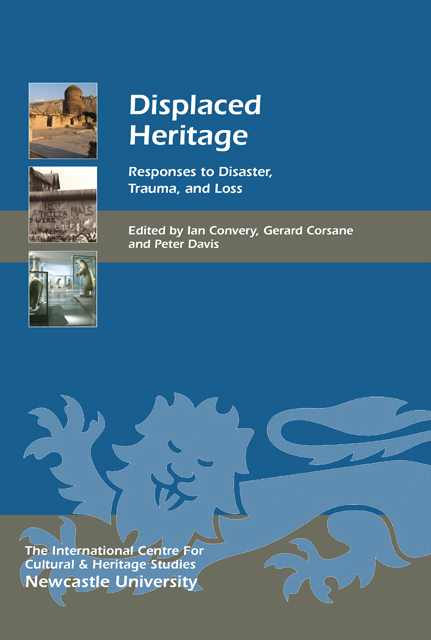Book contents
- Frontmatter
- Contents
- List of Illustrations
- Acknowledgments
- List of Abbreviations
- Preface
- Introduction
- Displaced Heritage: Histories and Tourism
- Displaced Heritage: Trauma, Confinement and Loss
- Displaced Heritage: Lived Realities, Local Experiences
- Displaced Natural Heritage
- Endpiece
- List of Contributors
- Index
- Heritage Matters
25 - Displacing Nature: Orang-utans in Borneo
Published online by Cambridge University Press: 24 February 2023
- Frontmatter
- Contents
- List of Illustrations
- Acknowledgments
- List of Abbreviations
- Preface
- Introduction
- Displaced Heritage: Histories and Tourism
- Displaced Heritage: Trauma, Confinement and Loss
- Displaced Heritage: Lived Realities, Local Experiences
- Displaced Natural Heritage
- Endpiece
- List of Contributors
- Index
- Heritage Matters
Summary
The forests of Borneo and Sumatra are a major hot-spot for biodiversity. They are home to the only two species of Asian great apes that survive today: the Sumatran orang-utan (Pongo abelii) and the Bornean orang-utan (Pongo pygmaeus). However, huge tracks of natural forests are being degraded by extractive industries (mining, timber harvesting, etc) or replaced with small-scale subsistence crops and large-scale industrialised monoculture (oil palm, acacias, eucalyptus, etc) throughout the region. As a result, entire wildlife populations are displaced or wiped out.
The destruction of these forests is a multi-faceted disaster for the orang-utan and for myriad other species. Indeed, the intense degradation and destruction of food resources lead to starvation, increased sensitivity to disease and stress, or to decreased reproduction. During waves of forest conversion, animals that are not killed are displaced and take refuge in remaining forest patches, resulting in significant alteration of the dynamics and structure of surviving wild populations. The newly created man-made landscape results in increased contact and conflict between people and wildlife. Crop-raiding orang-utans are often perceived as pests and are killed, although they are officially protected in both Indonesia and Malaysia. Surprisingly, our work in Kinabatangan (Sabah, Malaysian Borneo) indicates that orang-utans show an unexpected resilience to these disasters. To a certain extent, the animals are able to adapt their behaviour and ecology to these new environmental conditions. From a conservation point of view, it is essential to investigate this resilience in order to design and promote wiser land management practices that will reconcile economic growth with the long-term survival of orang-utans and other animal species.
It is also crucial to investigate how local communities’ perceptions of wildlife are being influenced by recent landscape transformation. The communities living in the Kinabatangan floodplain used to consider orang-utans as non-detrimental and peaceful creatures living in the depths of the jungle. The recent increase in conflicts between crop-owners and orang-utans has greatly changed this perception: from being part of their natural heritage, orang-utans are now a competitor and a hindrance to economic growth. Reconciling people and wildlife and identifying ways for local communities and displaced animals to cohabit peacefully is the major conservation challenge in these fractured landscapes.
The Changing Environment of the Orang-utan
Great apes are our closest living relatives (Harrison 2010). Orang-utans (literally ‘men of the forest’) occur solely in Borneo (Pongo pygmaeus) and in Sumatra (Pongo abelii).
- Type
- Chapter
- Information
- Displaced HeritageResponses to Disaster, Trauma, and Loss, pp. 273 - 282Publisher: Boydell & BrewerPrint publication year: 2014
- 2
- Cited by



